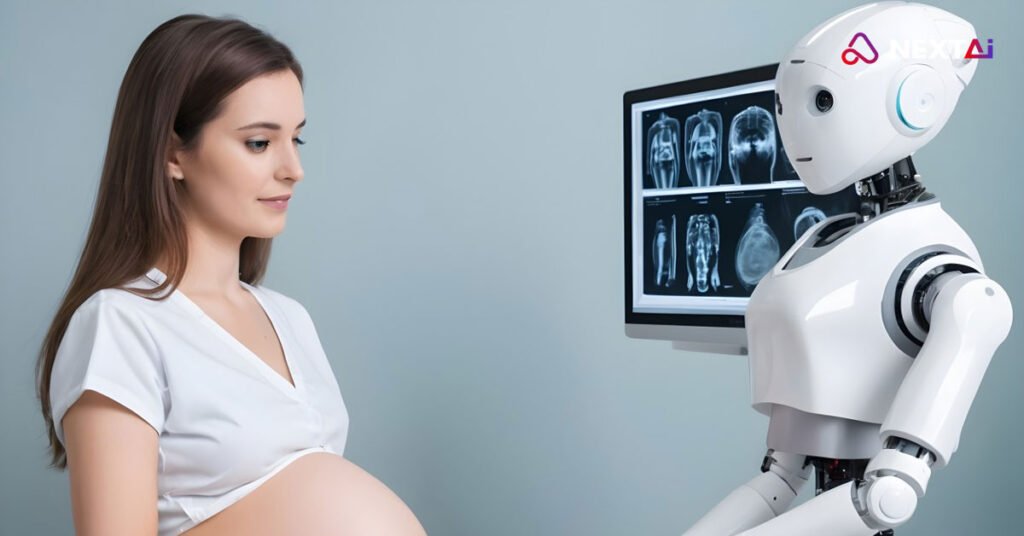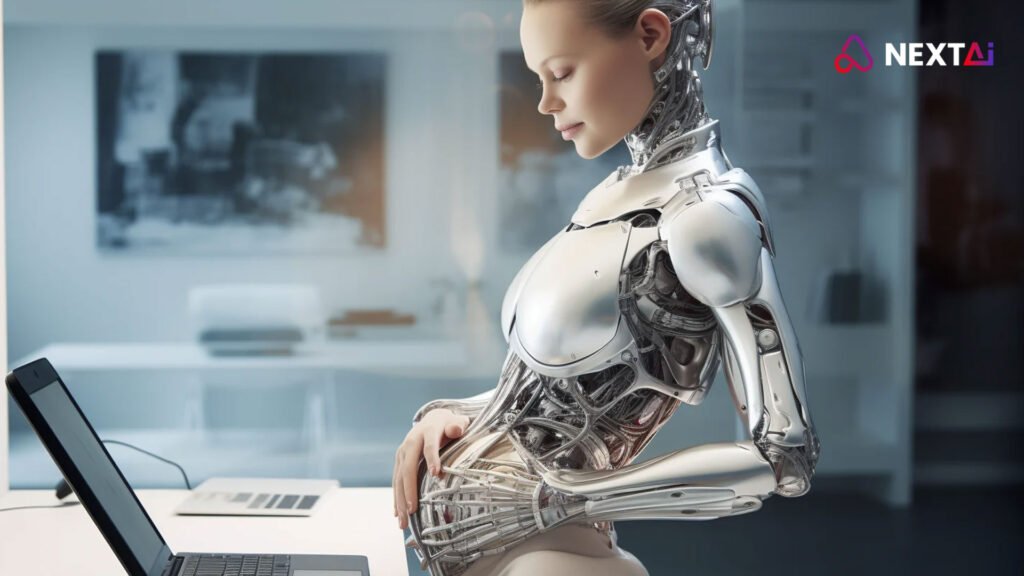
How AI is Transforming Pregnancy Care: Supporting Expectant Mothers with Precision and Personalization
By Rajiv Rajkumar Bathija | AI in Pregnancy Care
As a visionary in endocrinology and an advocate for leveraging Artificial Intelligence (AI) in healthcare, I am passionate about how AI is revolutionizing pregnancy care. With over 15 years of experience observing healthcare trends, I’ve seen firsthand the transformative power of AI in supporting both expectant mothers and healthcare providers. In this article, we’ll explore how AI is enhancing prenatal care, improving monitoring, and enabling more personalized pregnancy journeys for women and their families.

Pregnancy is a complex journey that requires tailored care and consistent monitoring to ensure both mother and baby remain healthy. AI is providing healthcare providers with the tools to personalize pregnancy care, predict potential complications, and offer real-time insights that enhance the experience of pregnancy. Here’s how AI is transforming pregnancy care, creating a new standard for prenatal health and wellness.
1. Early Detection of Pregnancy Complications
AI’s predictive analytics capabilities are helping healthcare providers identify and manage potential pregnancy complications early. By analyzing patient data, AI algorithms can detect warning signs for conditions like gestational diabetes, preeclampsia, and preterm labor, which can pose risks to both mother and baby if not managed proactively.
For example, AI can analyze maternal health records and highlight patterns in blood pressure or glucose levels that indicate risk factors for gestational diabetes. By identifying these risks early, doctors can recommend lifestyle adjustments, monitoring, and treatments that reduce the likelihood of complications, supporting healthier pregnancy outcomes.
2. Personalized Prenatal Care Plans
Each pregnancy is unique, and AI helps personalize prenatal care plans to cater to the specific needs of each mother. By analyzing health data, lifestyle factors, and medical history, AI enables obstetricians and endocrinologists to create tailored prenatal care plans that reflect the individual health requirements of each patient.
For instance, AI-driven tools can suggest personalized dietary recommendations, exercise plans, and supplements based on a mother’s specific health profile. This individualized approach ensures that mothers receive care that is aligned with their health needs, optimizing prenatal care and improving the overall pregnancy experience.
3. Continuous Fetal Monitoring with AI-Powered Wearables
AI-powered wearable technology is revolutionizing fetal monitoring, providing real-time insights into the baby’s health and development. Wearable devices can monitor the baby’s heart rate, movements, and other vital signs, allowing doctors to assess fetal health remotely and continuously.
For example, AI-driven wearables can alert healthcare providers to unusual patterns in fetal heart rate, helping to identify potential distress early. This proactive monitoring allows doctors to intervene promptly if necessary, providing peace of mind for mothers and ensuring timely medical attention when needed.
4. Predicting Preterm Labor Risks
Preterm labor is one of the most common complications during pregnancy, and early prediction is critical for managing and mitigating risks. AI helps predict preterm labor by analyzing maternal health indicators such as cervical length, hormone levels, and uterine activity.
AI models can identify high-risk pregnancies and recommend preventive measures, such as bed rest, medication, or increased monitoring, to reduce the likelihood of preterm delivery. By enabling early intervention, AI improves outcomes for both mother and baby, supporting a safer and healthier pregnancy journey.
5. Emotional and Mental Health Support for Expectant Mothers
The emotional journey of pregnancy can be overwhelming, and AI is offering mental health support for expectant mothers through virtual assistants and wellness apps. AI-powered mental health tools use natural language processing (NLP) to provide emotional support, suggest relaxation exercises, and offer resources for managing stress and anxiety during pregnancy.
For example, AI-driven apps can recommend meditation, breathing exercises, and stress-relieving techniques tailored to each mother’s preferences. By offering personalized mental health support, AI enhances the emotional well-being of expectant mothers, helping them maintain a positive outlook throughout pregnancy.
6. Genetic Screening and Personalized Risk Assessment
Genetic screening is essential for identifying any hereditary or chromosomal conditions that could affect the baby’s health. AI assists in analyzing genetic data, assessing risks for inherited conditions, and providing parents with a comprehensive understanding of potential genetic issues.
For instance, AI algorithms can analyze fetal DNA for markers associated with genetic disorders, allowing parents to make informed decisions and plan for any necessary medical interventions. This personalized risk assessment empowers parents with knowledge, helping them feel prepared and supported in their journey toward parenthood.
7. Remote Pregnancy Monitoring and Telemedicine
AI-driven telemedicine platforms allow expectant mothers to receive medical guidance, monitoring, and consultations without needing to visit a clinic, which is particularly beneficial for those with limited access to healthcare. AI supports virtual consultations, enabling healthcare providers to review real-time health data and provide care recommendations remotely.
For example, an AI-powered telemedicine platform can analyze blood pressure, weight, and glucose levels, alerting both the mother and her doctor to any potential concerns. This remote care model makes pregnancy monitoring more accessible and convenient, reducing the need for in-person visits while ensuring comprehensive care.
8. AI for Postpartum Care and Recovery
The postpartum period is just as important as pregnancy itself, and AI is extending support to new mothers during recovery. AI-powered tools provide postpartum health monitoring, track recovery progress, and offer guidance on physical and emotional well-being after childbirth.
For instance, AI can remind new mothers of important postpartum check-ups, monitor mental health indicators to detect signs of postpartum depression, and provide resources for breastfeeding, physical recovery, and newborn care. This extended support helps mothers transition into motherhood more smoothly, enhancing their overall well-being.
Final Thoughts: Shaping the Future of Pregnancy Care with AI
AI is setting a new standard for pregnancy care, providing expectant mothers with personalized, data-driven support at every stage of their journey. As a visionary in endocrinology and AI, I am deeply committed to advancing pregnancy care by integrating AI’s potential to improve health outcomes, provide emotional support, and deliver more personalized care to mothers and their babies.
From predictive analytics in preterm labor to wearable fetal monitoring and virtual mental health support, AI is empowering healthcare providers to deliver proactive, individualized care that adapts to each mother’s needs. The future of pregnancy care lies in harnessing AI to make the journey safer, healthier, and more fulfilling for mothers and families everywhere.
If you’re interested in learning more about how AI can enhance pregnancy care at your organization, let’s connect. Together, we can work toward a future where AI empowers every aspect of reproductive health and pregnancy care, providing hope and support to families around the world.
#ArtificialIntelligence #PregnancyCare #RajivRajkumarBathija #EndocrinologyVisionary #FetalMonitoring #PersonalizedCare #PredictiveAnalytics #MentalHealthSupport
Author: Rajiv Rajkumar Bathija
